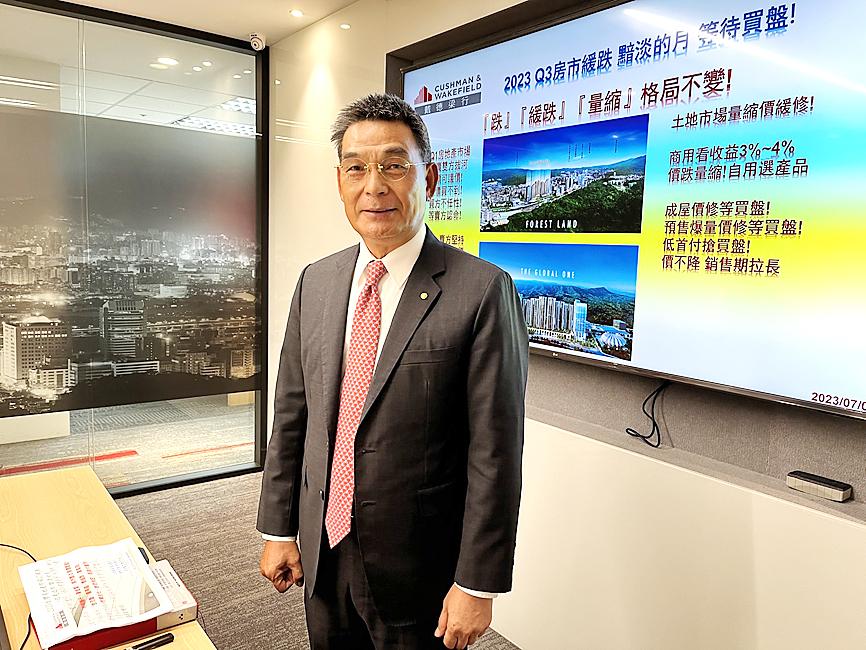Commercial property transactions last quarter surged 88.9 percent year-on-year to NT$52.2 billion (US$1.68 billion), uplifted by the liquidation sales of buildings owned by a real-estate investment trust (REIT) fund, global commercial property broker Cushman & Wakefield Taiwan said yesterday.
The Shin Kong No. 1 REIT (新光一號) fund sold its six buildings in Taipei for NT$30.7 billion that accounted for 60 percent of the trading volume during the April-to-June quarter, the company said.
All six buildings generate regular rent incomes and therefore attracted institutional investment buyers, Cushman & Wakefield Taiwan said, adding that the market would put up a lackluster performance in the absence of the REIT deals.

Photo: Hsu Yi-ping, Taipei Times
The buildings saw their value grow threefold from NT$11.3 billion upon the fund’s launch in 2005, therefore encourage domestic REIT funds, which are not as popular as peers elsewhere, analysts said.
It is not clear at this juncture how much the beneficiaries would receive following the liquidation.
Industrial properties intended for self-occupancy made up the bulk of commercial property sales, Cushman & Wakefield said.
In the first half of this year, commercial property transactions held virtually steady from a year earlier.
At the same time, land deals amounted to NT$20 billion, higher than NT$16.3 billion in the preceding quarter, but the first-half sum of NT$36.3 billion marked the lowest since 2016, when the government introduced combined property tax to cool the market, the consultancy said.
The muted showing reflected conservative approach on the part of developers and builders in response to interest rate hikes, credit controls and unfavorable measures to ban presale house contract transfers, it said.
Developers and builders have some land stock on hand and would rather stay on the sidelines until the nation’s economic and political uncertainty settles, said Billy Yen (顏炳立), managing director at Cushman & Wakefield Taiwan.
Looking forward, the market is likely to see further transaction declines with stable prices, Yen said, adding that downside risks loom larger than upside surprises in the foreseeable future.
Taiwan is to elect new legislators and a president, and candidates tend to pledge measures to make house prices more affordable, he said.
Housing transactions this year would fall 240,000 to 250,000, suggesting little improvement in the second half, Yen said.
Still, developers and builders display keen interest in urban renewal and MRT joint development projects, as they do not require land plots and are not subjected to credit controls, Cushman & Wakefield Taiwan said.

UNCERTAINTY: Innolux activated a stringent supply chain management mechanism, as it did during the COVID-19 pandemic, to ensure optimal inventory levels for customers Flat-panel display makers AUO Corp (友達) and Innolux Corp (群創) yesterday said that about 12 to 20 percent of their display business is at risk of potential US tariffs and that they would relocate production or shipment destinations to mitigate the levies’ effects. US tariffs would have a direct impact of US$200 million on AUO’s revenue, company chairman Paul Peng (彭雙浪) told reporters on the sidelines of the Touch Taiwan trade show in Taipei yesterday. That would make up about 12 percent of the company’s overall revenue. To cope with the tariff uncertainty, AUO plans to allocate its production to manufacturing facilities in

Taiwan will prioritize the development of silicon photonics by taking advantage of its strength in the semiconductor industry to build another shield to protect the local economy, National Development Council (NDC) Minister Paul Liu (劉鏡清) said yesterday. Speaking at a meeting of the legislature’s Economics Committee, Liu said Taiwan already has the artificial intelligence (AI) industry as a shield, after the semiconductor industry, to safeguard the country, and is looking at new unique fields to build more economic shields. While Taiwan will further strengthen its existing shields, over the longer term, the country is determined to focus on such potential segments as

TAKING STOCK: A Taiwanese cookware firm in Vietnam urged customers to assess inventory or place orders early so shipments can reach the US while tariffs are paused Taiwanese businesses in Vietnam are exploring alternatives after the White House imposed a 46 percent import duty on Vietnamese goods, following US President Donald Trump’s announcement of “reciprocal” tariffs on the US’ trading partners. Lo Shih-liang (羅世良), chairman of Brico Industry Co (裕茂工業), a Taiwanese company that manufactures cast iron cookware and stove components in Vietnam, said that more than 40 percent of his business was tied to the US market, describing the constant US policy shifts as an emotional roller coaster. “I work during the day and stay up all night watching the news. I’ve been following US news until 3am

COLLABORATION: Given Taiwan’s key position in global supply chains, the US firm is discussing strategies with local partners and clients to deal with global uncertainties Advanced Micro Devices Inc (AMD) yesterday said it is meeting with local ecosystem partners, including Taiwan Semiconductor Manufacturing Co (TSMC, 台積電), to discuss strategies, including long-term manufacturing, to navigate uncertainties such as US tariffs, as Taiwan occupies an important position in global supply chains. AMD chief executive officer Lisa Su (蘇姿丰) told reporters that Taiwan is an important part of the chip designer’s ecosystem and she is discussing with partners and customers in Taiwan to forge strong collaborations on different areas during this critical period. AMD has just become the first artificial-intelligence (AI) server chip customer of TSMC to utilize its advanced